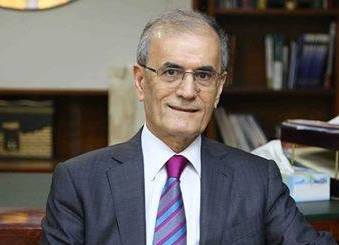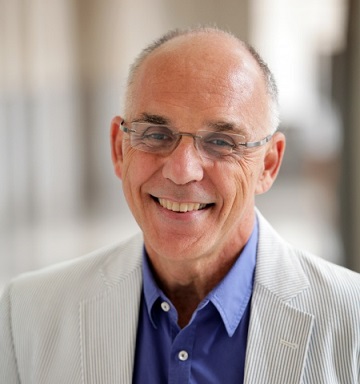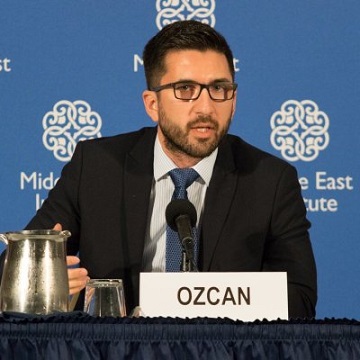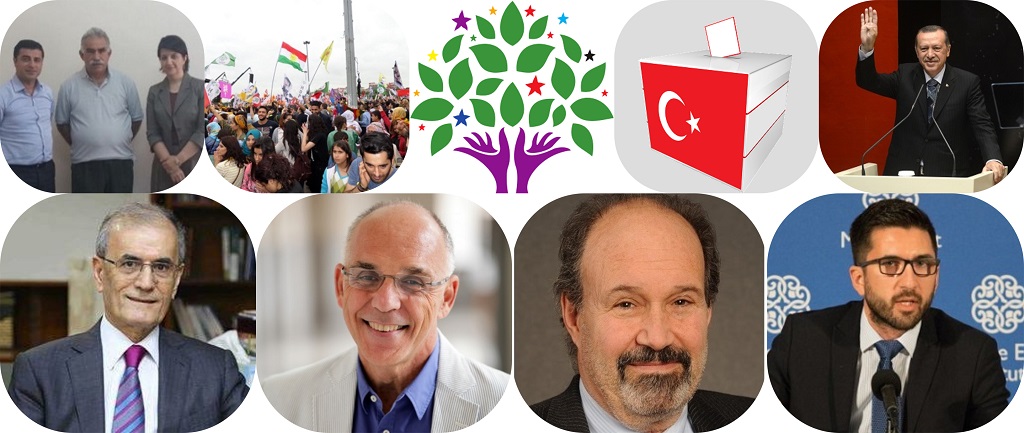Washington Kurdish Institute
Henri Barkey– Adjunct Senior Fellow for Middle East studies at the Council on Foreign Relations & Professor of International Relations, Lehigh University
David Pollack– Bernstein Fellow at The Washington Institute for Near East Policy
Giran Ozcan- HDP Representative to the United States.
Najmaldin Karim
“Makhmour is a refugee camp, more than 10,000 people live there, women, children, elderly people, and yet, Turkey repeatedly attacks that place based on the non-fact that these are harboring terrorists and training terrorists. “
“What we see in Turkey now is, really a hegemony in multiple fronts. In the Aegean, in Libya, in Iraqi Kurdistan, of course, they are still occupying Cyprus since 1974. That’s what they will do wherever they go, whether it’s maybe Kurdistan or any other place.”
“The Kurds are not the only victims of Erdogan and his regime, but the entire Turkish people.”
“Erdogan’s regime is an example of authoritarian regimes that comes to power with democracy and then they start trampling on the freedom press, freedom of religion, freedom of expression. And Turkey is really an authoritarian system now. And I think our policy as the United States government, is on the wrong side of history.”
“Erdogan is modern-day Mussolini and Saddam Hussien, really. Mussolini came to power through elections, he was even a journalist and we saw what he did. With regard to military attacks and attacks on civilians and everything, It’s exactly what Saddam Hussein was doing. It’s just a different way. It does, it does have a different name. And the last thing is I believe that what Erdogan is trying to do is establish is Muslim brotherhood control over the vast areas.”
Henri Barkey
“If the Kurdistan Regional Government (KRG) is in existence today in Iraq, it is because the United States intervene sometimes late, but nonetheless it did intervene. And essentially was a midwife to the creation of a federally Iraqi state where the KRG has a special status. Now, that model is one in which the Turks are afraid the United States will do it again in Syria. Because here you have an unpopular leader in Syria, just like you had an unpopular leader in Iraq. Iraq and Syria were both in the throes domestic political problems, the Turks to their credit essentially did make an accommodation with the KRG and the KRG and the Turkish government, as we can see today to have had very good relations. But the difference is that from Ankara’s perspective, you may tolerate one Kurdish autonomous region, but you can’t do two.
You cannot tolerate two. If the Syrian Kurds are also to get an autonomous region in Syria after the end of the civil war, and Assad’s departure, then again, it will be the Americans who will be creating this. Given the conspiracy theories in Turkey about how America is trying to divide Turkey, this all fits into this notion that United States is out there to destroy Turkey, to divide Turkey, to create a Kurdish state. “
“The Kurdish problem is here, it’s not going to go away, whatever Turkey does. It’s going to be here 10 years from now, 50 years from now if the Turks don’t deal with it. “
“The idea that the third largest political party in Turkey, the second-largest opposition party in Turkey leader is in jail is totally unacceptable from a political perspective, but he [Erdogn] has now decided to eliminate the HDP.”
David Pollack
“I very much appreciate the remarks by professor Barkey about how Erdogan was once and it’s only five years ago: the champion actually reconciliation with the Kurds, both inside Turkey and inside Syria. Not to mention of course the longstanding good relations between Erdogan’s government and the KRG, across the border in Iraq. I think that raises the question, or should raise the question in my mind and in all of our minds. Well, if he changed once in what I would call a negative direction, of course, toward the Kurds, both in Syria, inside Turkey, and to some extent, even in Iraq, if he changed once in the negative direction, is it possible that Erdogan could change again? In this time, perhaps going back into a more positive direction on all of these issues. And I had an opportunity to my own amazement to put that question in person to president at the time prime minister Erdogan himself in October of 2017.I would like to just relate to what it’s worth, what he told me. It was to me rather shocking at the time, but I think it has held up for the last two and a half years. And I don’t imagine that this is going to change in the future, and this is what he said.”
“I do think the Kurds in Syria and the Kurds in Iraq can continue to count on American support up to a point, certainly not to the point of independence or Iraqi Kurdistan, and not to the point of full regional autonomy in Syrian Kurdistan. But at least the point of some protection for their local self-government and their physical safety from the United States. However, for the Kurds in Turkey or for that matter in Iran, which we haven’t really talked about. I am sorry to have to say that I don’t see the US government willing to take much if any action in order to advance their agenda or protect their basic human and political rights”
Giran Ozcan
“we’re making a distinction between the way the Turkish state has historically approached the Kurdish question and the way the AKP government led by Erdogan is approaching it now. I think that the distinction here that needs to be made is that the Turkish state inherently and historically has an inherent animosity towards the Kurds and the Kurdish existence in the region. And this is grounded on the way to the Turkish nation-state, and the Republic of Turkey was founded, in an area where you have millions of Kurds, you have Armenians. The way the Turkish Republic was founded has left it with a very inherent animosity, but also insecurity when it comes to other ethnicities and especially, the Kurdish ethnicity and existence in the region. “
“As the HDP rep I may be tasked with talking about the difficulties that the HDP is facing, but I also want to give a few minutes to the difficulties that the Turkish state is facing right now. And as we watch this unfold, the clash between the AKP elite, which has tried to embed itself in the Turkish state structure for the past almost 20 years, and the resisting old guard, the Kemalists bureaucracy and the security structure. Right now, I don’t want to turn this into a history seminar, but right now we see that the people that represent the old Kemalists guards and the current AKP government are in a very tense partnership. And I think this plays out in parliament and in government right now with the AKP-MHP Alliance, but also when we saw with how the AKP partnered with the Gulen movement, how they defanged the Kemalist old guard, the Kemalist bureaucracy, and how Erdogan after splitting with the Gulanist movement had actually revitalized the people that he put in prison that he helped put in prison in 2010, 2011, with the arrogant and controls.”
About the speakers:
 Dr. Najmaldin Karim is the President of the Washington Kurdish Institute (WKI) and former governor of Kirkuk province-Iraq. Dr. Karim was born in Kirkuk Iraq, where he finished his high school education, before attending Mosul Medical College. After medical school, Dr. Karim was elected to the leadership of the Kurdish Student Union. In 1972, he joined the peshmerga forces and served as a physician and peshmerga until March 1975. Dr. Karim immigrated to the United States in 1976, where he finished his residency at George Washington University specializing in neurosurgery where he also served as an associate clinical professor. In the U.S., Dr. Karim was a pioneer of Kurdish activism, and was a founding member of the Kurdish National Congress of North America, serving as its president from 1991 to 1999. Dr. Karim testified before the U.S. Senate Foreign Relations Committee in June 1990 on Saddam Hussein’s atrocities in Kurdistan, including the Anfal campaign of genocide and the use of chemical weapons, and testified before numerous other congressional committees relating to Iraq and Kurdistan. In April 1991, Dr. Karim was the first Kurd to be officially received by the U.S. State Department. Read more.
Dr. Najmaldin Karim is the President of the Washington Kurdish Institute (WKI) and former governor of Kirkuk province-Iraq. Dr. Karim was born in Kirkuk Iraq, where he finished his high school education, before attending Mosul Medical College. After medical school, Dr. Karim was elected to the leadership of the Kurdish Student Union. In 1972, he joined the peshmerga forces and served as a physician and peshmerga until March 1975. Dr. Karim immigrated to the United States in 1976, where he finished his residency at George Washington University specializing in neurosurgery where he also served as an associate clinical professor. In the U.S., Dr. Karim was a pioneer of Kurdish activism, and was a founding member of the Kurdish National Congress of North America, serving as its president from 1991 to 1999. Dr. Karim testified before the U.S. Senate Foreign Relations Committee in June 1990 on Saddam Hussein’s atrocities in Kurdistan, including the Anfal campaign of genocide and the use of chemical weapons, and testified before numerous other congressional committees relating to Iraq and Kurdistan. In April 1991, Dr. Karim was the first Kurd to be officially received by the U.S. State Department. Read more. Henri J. Barkey is an adjunct senior fellow for Middle East studies at the Council on Foreign Relations and the Bernard L. and Bertha F. Cohen Chair in International Relations at Lehigh University. At CFR he works on the strategic future of the Kurds in the Middle East. Previously he was the Director of the Middle East Center at the Woodrow Wilson Center for International Scholars (2015-2017). Barkey served as chair of the Department of International Relations at Lehigh University for thirteen years. He served on the State Department Policy Planning Staff (1998-2000) working on the Eastern Mediterranean, the Middle East and intelligence-related issues. He was a non-resident Senior Associate at the Carnegie Endowment for International Peace (2008-2011). Currently he also serves as the chair of the Academic Committee on the Board of Trustees of the American University in Iraq, Sulaimani. He has written extensively on Turkey, the Kurds and other Middle East issues. Read more.
Henri J. Barkey is an adjunct senior fellow for Middle East studies at the Council on Foreign Relations and the Bernard L. and Bertha F. Cohen Chair in International Relations at Lehigh University. At CFR he works on the strategic future of the Kurds in the Middle East. Previously he was the Director of the Middle East Center at the Woodrow Wilson Center for International Scholars (2015-2017). Barkey served as chair of the Department of International Relations at Lehigh University for thirteen years. He served on the State Department Policy Planning Staff (1998-2000) working on the Eastern Mediterranean, the Middle East and intelligence-related issues. He was a non-resident Senior Associate at the Carnegie Endowment for International Peace (2008-2011). Currently he also serves as the chair of the Academic Committee on the Board of Trustees of the American University in Iraq, Sulaimani. He has written extensively on Turkey, the Kurds and other Middle East issues. Read more. 
Dr. Pollock served previously as senior advisor for the Broader Middle East at the State Department, a post he assumed in 2002. In that capacity, he provided policy advice on issues of democracy and reform in the region, with a focus on women’s rights. He also helped launch the department’s $15 million Iraqi Women’s Democracy Initiative and the U.S.-Afghan Women’s Council, working directly with advocates across the Middle East.
From 1996 to 2001, Dr. Pollock served in several other State Department policy advisory positions covering South Asia and the Middle East, including four years as regional expert on the secretary of state’s Policy Planning Staff. Previously, he was chief of Near East/South Asia/Africa research at the U.S. Information Agency, where he supervised the government’s study of public opinion, elite attitudes, and media content across the three regions. In 1995-1996, he was a scholar-in-residence at The Washington Institute, where he authored the widely read Policy Paper The ‘Arab Street’? Public Opinion in the Arab World.
Dr. Pollock has served as a visiting lecturer at Harvard University and as assistant professor at George Washington University. He has traveled widely in the Middle East and maintains a large network of contacts in government, academia, and business throughout the region. Read more.


